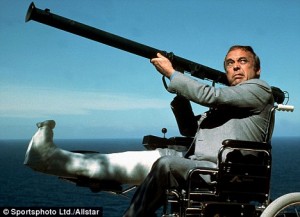One of the dangers about history is that we are always vigilant about the dangers of the past yet fail to recognise them in their new form. Europeans in particular tend to get very concerned about neo-nazi groups who deck themselves out with Hitler tee-shirts and swastikas, and rant about Jews and defend or deny the Holocaust, as if keeping an eye on these headbangers is all we need to do. The reality, of course, is that those people are not as much a threat to our society as a distraction from the real threats to our free society. Fascism is back, and it won’t look comical. It’ll look and sound like you and me. In fact, it look like it listens to you and me, and that’s what has always been its appeal. Millions of relatively decent people in German, Austria, Italy, Spain, Chile, Argentina and other places voted for fascists because they regarded them as the least worst or most responsive option on the ballot. That’s what we need to be afraid of.
Fascism in the modern context will be the seizure of power followed by the exercise of power with little if any legal restraint, and not necessarily against the old foes of non-Aryans and Jews. Indeed, many on the hard-right have now begun to identify with Israeli right-wingers in their prejudice against Islam and Arabs, and are beginning to express sympathy towards Israel as a perceived “frontline”.
No, New Fascism will instead be fronted by articulate and attractive spokespeople who will, as their predecessors did, connect with ordinary people in their concerns, offering clear empathy and simple solutions as opposed to the old political elites with their talk of Troikas and IMF memorandums and fiscal compacts.
Indeed, it’s possible that the New Fascists will not be purely and ideologically right-wing in the traditional sense. Immigrants can of course be targeted as a simple source of problems, but the New Fascists will also be quick to defend the left wing provision of state services and welfare payments, and will point to an elusive and mythical super-rich as the source of pain and also funding. Political hacks like to put fascists neatly on the far right, but listening to the policy platforms of the BNP in the UK or FN in France is listening to an old style Labour party. Fascism is neither right nor left, but the concept of the party doing whatever it takes, and trampling over whomever it has to, to get what it wants.
The key to the success of New Fascism will be its recognition of the instant gratification seeking and over emotional society we live in. The reason, they will say, that you are not getting more welfare payments is not because you or your neighbours do not want to pay more tax, but because bad people in government hate you or favour other groups over you. The cold hard logic of spending versus revenues will be dismissed by an attractive candidate on the doorstop telling you that the governing parties don’t care about people like you. Already we can see someone like Beppe Grillo in Italy, who is not a fascist, but has won 25% of the vote on an emotional platform without having to specify what decisions and choices he would make.
The rise in the New Fascism has been helped by the professionalisation of democratic politics. With western politics now dominated by leaders who see winning the election, and remaining elected as being the overriding priority, they are losing the confidence of their voters sooner and sooner after entering office. Look at Francois Hollande, or Sarkozy before him.
It’s understandable, as politicans more and more build their platforms on an emotional promise which is almost impossible to deliver in office and certainly impossible of measuring in terms of delivery. Yet the system seems open to a self-destructive ratcheting up, where a reasonable candidate offering a thoughtful, measurable and deliverable programme will almost certainly be defeated by an emotionally oversold rival, who will then be incapable of meeting her voter’s expectations, and will then be defeated by an even more oversold opponent.
The problem for the democratic process in this regard is that it leads to a burnout of the conventional political system, as in Spain and Greece where both the centre-right and centre-left have been discredited by the failure to deliver, and voters look to extremist options.
The danger is not that the New Fascists will succeed in power. They won’t, as their platforms will be built on an evern greater amount of lies and falsehoods than the centrist parties. The fear is that they will attempt to dismantle the democratic checks and safeguards of the courts and parliament and the media in an effort to “get things done”.
Look at Hugo Chavez’s regime as an example, which can certainly have been described as New Fascist although not in a racial sense, but certainly in terms of a strongman approach to politics and the creation of an Emmanuel Goldstein-type “Daily Hate” figure of the United States as the source of his society’s woes.
But then, Chavez himself is a telling tale in terms of the attractions of New Fascism, because he was genuinely popular with millions of Venezuelans who were economically better off as a result of his actions. This is the final lesson to heed about the New Fascists: As with Pinochet, they do not just impose their will upon a society through sheer force. They create an attractive model which recruits people throughout society who feel that they are better off under such a system, and that is the greatest threat to an individual rule of law respecting democracy:
The idea that there might be something better.

